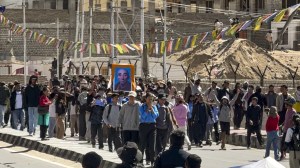‘Too early to come to a conclusion’
The lead investigator probing into the plane crash that killed former South African captain Hansie Cronje today said it was too early to spe...

The lead investigator probing into the plane crash that killed former South African captain Hansie Cronje today said it was too early to speculate on the reason behind the disgraced cricketer’s death since the authorities are yet to come out with the final report.
Dr Andre de Kock of the Civil Aviation Authority, probing the case, rubbished the claims by British magazine The Observer sports monthly that Cronje could have been murdered since some “feared he would one day tell the full truth, and then many more would be implicated.”
“A large part of the accident report had been compiled, and once all the information was received, the CAA would start finalising the report,” said Andre, adding he could need another three months to collect details to make an assessment of what could have caushed the accident.
“It is a complex investigation. We’ve already worked through the flight recorder and cockpit recorder – commonly known as the black boxes – as well as documentation relating to the pilots, such as licensing and medicals.”
He said the last instrumentation component of the Hawker Siddeley 748 twin-engined turboprop aircraft, needed to help conclude the investigation, would be sent to the United States later today for testing.
The CAA is also putting together the “last pieces of the puzzle” around the aircrash near George that killed Cronje and two pilots last year, Andre said.
Trevor Abrahams, CAA Commissioner, also termed the claims made by the magazine as “fictitious.”
“We are not aware of any such report. I don’t know where it comes from and certainly the indication that someone involved in the actual investigation from the CAA made any such statements are not true,” Abrahams told the SABC Radio news today.
In its report, The Observer sports monthly quoted an unnamed investigator close to the case as saying that “a lot of people wanted Cronje dead. They feared that he would one day tell the full truth, and then many more would be implicated.
“I know people who have looked closely into what happened but who were warned off by threatening phone calls. They’re scared of getting a bullet in the head,” the report quoted the investigator as saying.





- 01
- 02
- 03
- 04
- 05


























